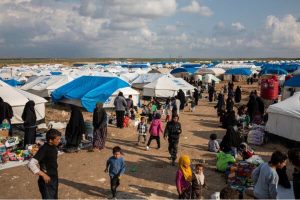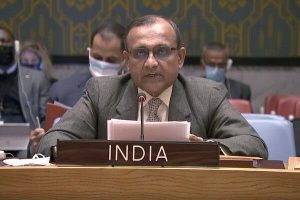By: The Global Accountability Network
Russian War Crimes Against Ukraine - The Global Accountability NetworkUncategorized
Statement in Response to the Conflict in Ukraine
Ashurst Russia Sanctions Tracker
Ashurst LLP, an international law firm, has been keeping an updated tracker of the sanctions being placed on Russia in response to the Russian invasion of Ukraine. The tracker keeps record of the sanctions being placed by the United Kingdom, the European Union, Japan, and Australia. The tracker can be accessed here.
France Violated Rights of French Children Detained in Syrian Detention Camps by Failing to Repatriate Them, UN Committee Finds
By: Holly Popple
Journal of Global Rights and Organizations, Senior Associate Editor
GENEVA, Switzerland — France violated French children’s rights by failing to repatriate them from Syrian detention camps in which they were detained for years in dangerous conditions, according to new findings issued by the UN Child Rights Committee.

The Child Rights Committee, which monitors States parties’ adherence to the Convention on the Rights of the Child, issued its findings after considering three separate cases filed by a group of French nationals whose relatives were currently detained in Rawj, Ayn Isa, and Hawl camps in northeastern Syria, which is under the control of Kurdish forces.
The three cases involved 49 children who were detained in these camps due to their parent’s alleged ties with Da’esh, an ISIL terrorist group. Of those 49 children for whom the cases were brought, 38 remain detained in these camps without a timeline for release. Most of these children are under twelve and many are as young as five years old.
In these findings, the Committee condemned France’s failure to repatriate these children based on the lack of due consideration given to the best interests of the child victims when reviewing requests for repatriation, in part due to the inhumane and life-threatening conditions endured by detainees. Committee member Ann Skelton commented on the state of the camps, saying, “The children are living in inhuman sanitary conditions, lacking basic necessities including water, food and healthcare, and facing an imminent risk of death.” She recounted the fact that since 2021, 62 children have reportedly died in the camps and called on France to take immediate action to protect the children. This immediate action refers to repatriation when viable but includes additional measures in the meantime meant to mitigate the health and safety risks of detainees while they still reside in Syria.
Health concerns from unsanitary conditions are far from the only issue that implicates human rights violations occurring in these camps. Children are deprived of their right to education, liberty, security, life, and freedom from violence. Physical violence, psychological trauma, harassment, violent extremism, and trafficking are rampant in these camps and pose a daily threat to those who live there.
Many countries have been hesitant to repatriate these children due to both legal and practical concerns, citing national security concerns and logistical difficulty in ascertaining the identity and nationality of the children as top reasons for the failure of repatriation of the children thus far. However, the interests in protecting these children from the harm they endure from continuing to be detained in these camps cannot be justified by the fact of their parent’s alleged ties to ISIL. France and other countries that have the power to repatriate these children must take action to prevent more human rights violations and return them to their country of origin.
For further information, please see:
HIR – French Children in Syria: The Repatriation Question – 13 May 2021
OHCHR – Convention on the Rights of the Child – 2 Sept. 1990
OHCHR – The World Must Bring Children Home from Syrian Detention Camps – 22 Sept. 2021
UN News – France Violated Rights of French Children Detained in Syrian Camps – 24 Feb. 2022
Editorial: India’s Abstention From Condemning Russia in the United Nations Security Council Is Disappointing
By: Rohan Bhattacharjee
Impunity Watch News Staff Writer
India’s abstention on the United Nations Security Council (UNSC) draft-resolution vote on the condemnation of Russia’s blatant and unilateral aggression on Ukrainian territory, is deeply disappointing.

Close alignment with Russia has been an integral part of India’s post-independent foreign policy. Russian contribution to Indian scientific, economic, and defense development, including military support on key foreign policy events such as the Bangladesh liberation war in 1971, are unparalleled. The shift of the global order since the 90s however, and the rapidly evolving global geo-political developments signifying increasing polarization between free societies led by the U.S on one side and authoritarian states such as Russia and China on the other, amidst intensifying cultural and people-to-people ties between India and the western world, require an urgent rethinking of India’s ‘strategic neutrality’ policy.
In 2020, as China entered Indian territory in Ladakh, killing over 20 Indian soldiers, Indian diplomats travelled to capitals around the world, frantically asking leaders to condemn China’s unilateral actions violating India’s territorial integrity and sovereignty.
The same diplomats, two years later, were instructed to abstain from condemning Russia’s aggression against Ukraine in the UN Security Council in demonstration of its ‘non-alignment’ policy. India’s isolation on the international stage was manifest as not a single member of the UN Security Council voted against the resolution except for Russia.
This balancing act, a legacy of the Non-Alignment Movement (NAM), cannot be more absurd in today’s global scenario. Besides exposing India’s hypocrisy, it showcases that India’s concerns over the principles of respecting the territorial sovereignty of states are only seasonal and arise only at a convenient moment when its own interests are at stake. It is inapplicable to tyrants and dictators like Putin. Such a transactional approach in foreign policy does not bode well for India’s future and its image as a responsible global power.
Two distinct worlds are fast emerging in areas of artificial intelligence, machine learning, and finance – dominated by the U.S-led free world on one side and authoritarian states such as Russia and China on the other. Because of the geo-political rivalry, the two systems continue to become ever more parallel and distant. For India to continue with its transactional approach towards world affairs, continuing its purchase of Russian weapons systems on one hand, making use of American-designed defense software on the other – while the U.S-led alliance continues to place more crippling sanctions on Russia, it will become more difficult for India to enjoy the best of both worlds for which it is time that it finally make a choice.
India has enormous scope of gaining immensely from the west than it can gain from authoritarian states such as Russia or China. The sheer size of the American economy and the western world’s unparalleled appetite for progress in basic research, science, and technology, fueled by free-market capitalism and a free and open society promoting honest intellectual discourse, will benefit India much more in the long run than short-term transactional relationships. The U.S-led western alliance, with its convergence with India on democratic values and key national security priorities, are natural partners for India in the long-run.
India also can tap into the influence of its extremely large, well-integrated, and successfully placed diaspora in the western societies to influence government policy. The Indian diaspora in the U.S alone, for instance, numbers over 4.2 million, compared to a paltry 14,000 in Russia. Members of the diaspora are situated in the highest echelons of government and industry, providing an opportunity for the Indian government to directly influence decision making processes favoring its agendas.
For these reasons, India must take a bold stance against authoritarian regimes in the world to establish itself as a responsible global power and a leader of the free world, bin its policy of strategic neutrality, and realign more concertedly with the western-led alliance of democracies. It should begin by condemning Vladimir Putin’s blatantly illegal actions in Ukraine.